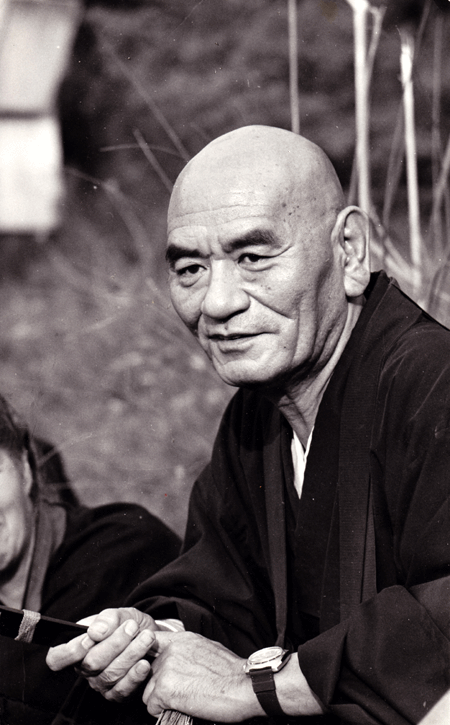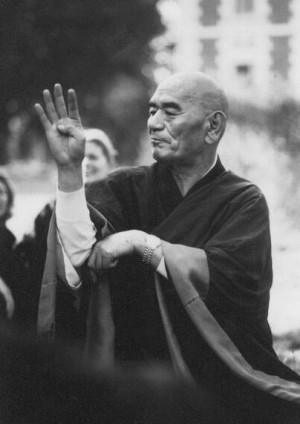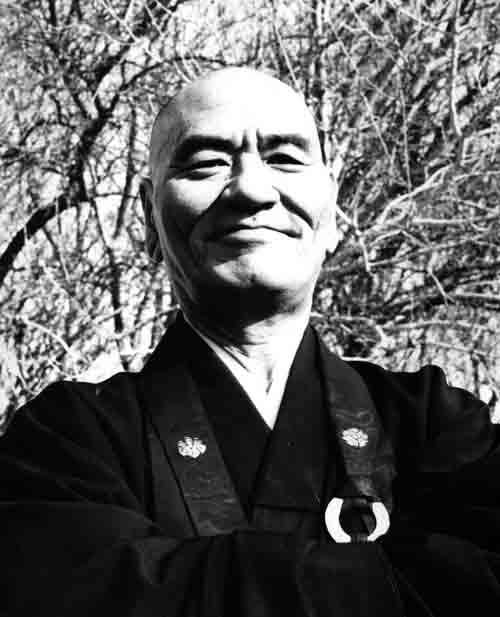About Press Copyright Contact us Creators Advertise Developers Terms Privacy Policy & Safety How YouTube works Test new features Press Copyright Contact us Creators. Taisen Deshimaru (1914-1982) was a Japanese Zen Master, and the individual largely responsible for bringing Soto Zen to Europe. A legendary figure, widely acknowledged throughout the Zen world, he stands in the ranks of the great Zen teachers of modern times, including, Suzuki Roshi, Maezumi Roshi,. Taisen Deshimaru (Yasuo Deshimaru) was born in 1914 into a Samurai family of the Saga Prefecture, located on Kyushu Island, in southern Japan. He was raised by his mother, a fervent follower of the Nembutsu Buddhist sect, and by his grandfather, who was a Samurai before the Meiji Revolution that abolished the Samurai class. Taisen Deshimaru (birth name: Yasuo Deshimaru) (1914-1982) was a Japanese Zen Buddhist teacher.
- Taisen Deshimaru
- Taisen Deshimaru Quotes
- Taisen Deshimaru Books
- Taisen Deshimaru Quotes
- Taisen Deshimaru Pdf
Taisen Deshimaru (Yasuo Deshimaru) was born in 1914 into a Samurai family of the Saga Prefecture, located on Kyushu Island, in southern Japan.
He was raised by his mother, a fervent follower of the Nembutsu Buddhist sect, and by his grandfather, who was a Samurai before the Meiji Revolution that abolished the Samurai class. As a youngster, Taisen Deshimaru was strongly influenced by the spirit of Bushido and by the martial arts, as his grandfather taught him both Kendo and Judo.
In his youth, he was interested in spirituality, and he studied Christianity. His numerous meetings and discussions with Christian monks, priests, and theologians left him unsatisfied. Sophos utm wireguard download. He found his education in Christianity to be lacking. Soon after, dissatisfied with Christianity, he eventually returned to Buddhism.
Having no interest in his mother’s Nembutsu Buddhism, he came into contact with the Rinzai school of Zen. He eventually became dissatisfied and felt unfulfilled with Rinzai, and he subsequently left the organization.
Taisen Deshimaru
In 1935, while studying economics in Tokyo, twenty-one-year-old Taisen Deshimaru grew interested in Soto Zen and met Master Kodo Sawaki, and became his disciple. Nobody knew at the time that Taisen Deshimaru would loyally follow Kodo Sawaki for thirty years.


After following Kodo Sawaki’s teaching for a year, Taisen Deshimaru wanted to become a monk, but Sawaki Roshi encouraged him to remain a lay practitioner. Each time Deshimaru asked to be ordained, Master Sawaki sent him away, telling him he should continue to practice Zazen in society. Sawaki claimed that Zen is not separated from life and that Deshimaru should experiment with many things in life beyond the monastery.
After finishing his studies at the University, Taisen Deshimaru found a job as a manager of a cookie factory. He got married and had three children.

Right after the Japanese attacked Pearl Harbor during World War II, Taisen Deshimaru was recruited by the Japanese army. It was at this time that he and his Master parted ways. Kodo Sawaki told his disciples these last words: “This may be the last time we see one another. Nevertheless, love all mankind, regardless of race or creed”.

Because of his myopia, Deshimaru was discharged from the front. Instead, he was sent to Indonesia for several years to perform administrative duties for the Japanese army. He narrowly escaped death several times while in Indonesia.

When the Second World War was finally over, Deshimaru rejoined his Master, Kodo Sawaki, and followed him until his Master’s death fourteen years later.
In November of 1965, shortly before Kodo Sawaki fell ill, Deshimaru received ordination from his Master. While on his deathbed in December 1965, Sawaki gave the Shiho, or transmission, to Taisen Deshimaru. Thus, Deshimaru himself became a master in the tradition of Soto Zen.
Sawaki expressed his wish for Deshimaru to spread Zen to other parts of the world, as Bodhidharma had done centuries ago. Deshimaru decided to travel to Europe and spread the true teaching of Soto Zen there.
Treenity. To pay homage to his Master, Taisen Deshimaru sat in Zazen for forty-nine days after Kodo Sawaki’s death.
In 1967, resolute to spread Zen in Europe, Deshimaru put his family in the hands of his son and boarded the Trans-Siberian Railway for France. He arrived in Paris without any money or possessions, except his zafu, his Master’s kesas, and notebooks. He was not able to speak French and only knew English poorly.
Taisen Deshimaru lived in the back of a health-food store where he practiced Zazen every day. He made a living by giving lectures on Zen Buddhism and shiatsu massages.
Following his Master’s wish, Deshimaru Sensei was driven by a profound desire to spread the practice of Zazen in Europe. An especially notable thing about Taisen Deshimaru is that he made his Zen teaching accessible to the Western mind, which is often unfamiliar to Buddhism.
Impressed by the unique personality of Deshimaru Sensei, a growing number of people started showing interest in Zen and started practicing with him. In 1970, Master Deshimaru created The European Zen Association, which would later become The International Zen Association (AZI). A year later, Taisen Deshimaru opened the first Zen dojo in Paris, which was entirely dedicated to the practice and teaching of Soto Buddhism.
Macos iso. (…) he encouraged his disciples to live without ego, self-interest, or desire for personal profit
While living in France, Master Deshimaru wrote numerous books destined to introduce Zen Buddhism to the Western World. His simple and straight to the point approach make his books accessible to both the general public and the advanced practitioners. His most famous books are The Ring of the Way, Zen & Karma: Teachings of Roshi Taisen Deshimaru, and Questions to a Zen Master.
During the following years, with the help of his ever-growing number of students, he created more than one hundred Zen dojos in both Europe and North America. In 1979, Deshimaru Sensei founded in France, the Zen temple of La Gendronnière, the largest Zen temple outside Japan. The temple was officially recognized by Japanese Soto Zen authorities as the Head Temple of Europe.
In early 1982, Taisen Deshimaru was diagnosed with pancreatic cancer. He continued to practice with his disciples through the spring of that year. As he left for Japan to receive medical treatment, his last words were, “Please, continue Zazen.” Taisen Deshimaru Roshi died in Japan on April 30th, 1982.
Taisen Deshimaru left his disciples with the essence of Zen, which had been transmitted from Master to disciple since the Buddha. His teaching was very humorous and straightforward, yet concrete and deeply rooted in daily life. Like Dogen Zenji and Kodo Sawaki before him, he insisted on the importance of shikantaza, and he encouraged his disciples to live without ego, self-interest, or desire for personal profit, and to follow the cosmic order “unconsciously, naturally and automatically”.
Taisen Deshimaru Quotes
Because of his unique character, his uncompromising Zen practice, and his pioneering mission to spread Zen in Europe, Taisen Deshimaru is called, in his homeland of Japan, “The 20th Century Bodhidharma”.
The Heart Sutra from a Japanese Zen Buddhist Perspective.
A Book for Students of Zen Buddhism; Religion Scholars;
Philosophy Students, and Readers of Taisen Deshimaru’s Books.
Taisen Deshimaru Books
“Mushotoku mind” means an attitude of no profit, no gain. It is the core of master Taisen Deshimaru’s Zen. This respected teacher of Japanese Soto Zen moved from Japan in 1967 and brought this work to Paris, from where it was disseminated throughout the West. This book presents his commentary on the most renowned of Buddhist texts, the Heart Sutra, known in Japanese as Hannya Shingyo—a philosophical investigation on the futility of philosophical investigation.
Deshimaru’s work fills a great gap in the interpretations of this seminal text in that he emphasizes “mind-emptiness” (ku) as the foundation of Zen practice, in contrast to the usual “mindfulness” focus of many other Zen approaches. This “emptiness” and “purpose of no purpose” is one of the most difficult ideas for Westerners to understand. Yet we know that our most cherished values are based on mushotoku mind when it comes, for example, to love. We value the unselfish love of family or country that is based not on what we can get from the relationship but on what we can give. We know, too, that these virtues are not accomplished directly through our will but indirectly through dropping our expectations.
His lectures on this subject have been translated by Ilsa Fatt and edited by Reiryu Philippe Coupey of Deshimaru’s British and French groups; and here completely revised and reedited for an American audience by Reishin Richard Collins. This edition emphasizes Deshimaru’s chorus: Mushotoku mind is the key attitude characterizing the way of the Buddha, the way of the bodhisattva, The way of Zen and zazen, and the way of all sutras (teachings).
Taisen Deshimaru Quotes
Taisen Deshimaru (d. 1982) was the founder of the Association Zen Internationale, one of the largest influences on Zen in the West. He is author of: The Ring of the Way and The Zen Way to Martial Arts: A Japanese Master Reveals the Secrets of the Samurai.
Taisen Deshimaru Pdf
Richard Collins is a Zen teacher in the lineage of Taisen Deshimaru and Dean of Arts & Humanities at California State University, Bakersfield.
